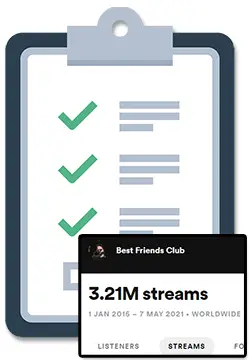Music production is one of the things that I’m most passionate about and have spent 1,000s and 1,000s of hours on at this point – publically released music alone, I have over 60+ songs on platforms like Spotify and YouTube!
Here’s a look at some of my most recent and popular music productions:
Whether you’re a musician looking to produce your own music, or an aspiring producer looking to work with other artists, there are several essential things I’ve learned over the years that I think you should learn on your own music production journey.
Let’s take a look at the 15 most important skills you will want to learn as a budding music producer to help you get started, my friend. 🙂
1. Digital Audio Workstation (DAW)
A DAW is a software program used for recording, editing, and producing music – this is where all modern music production happens so learning a DAW is absolutely paramount.
There are many popular DAWs available, such as Ableton, Logic Pro, and FL Studio with each having its own unique features and workflow but sharing common tools and concepts.
My favorite DAW is Ableton, but you should experiment with a few different ones to figure out which gels with you the most. The key here is not to find the “best” DAW but instead to find the “best DAW for you”.
Ultimately, the best DAW is the DAW that you personally know best, so take the time to really learn it inside and out (see: read the !@#$ing manual!).
2. MIDI and Virtual Instruments
MIDI stands for Musical Instrument Digital Interface, and it’s used to control virtual instruments and other devices.
This allows you to program in notes, chords, or drum patterns into your DAW so that you can produce music even if you don’t know how to play any of those actual instruments!
Virtual instruments are software-based instruments that can produce a wide range of sounds and textures from vintage synthesizers to luscious grand pianos to drums and more.
Learning how to use MIDI and virtual instruments is essential for creating electronic music and manipulating sounds.
I’d recommend starting with the virtual instruments and sounds that come with your DAW at first because many can be very good and you can figure out what you like before spending money on any third-party plugins.
3. Composition and Songwriting
Learning composition and songwriting is essential for any musician or music producer looking to create original and unique music because it allows you to express your creativity and emotions while also creating music that resonates with yourself and others.
Composition and songwriting also help you develop a deeper understanding of music theory and structure, which can be applied to other areas of music production such as arranging, mixing, and mastering. It also helps you to better communicate your ideas with other musicians and producers.
I’d recommend starting off by picking 2 or 3 tracks in the style of music you want to create and studying them very closely: write down notes on the sections of the song, where instruments are introduced or taken away, etc.
4. Arrangement / Structure
Learning how to structure or arrange music is important for creating a cohesive and engaging musical composition.
Arrangement involves organizing and ordering musical elements such as melodies, harmonies, and rhythms, in a way that builds tension and release and guides the listener through the musical journey.
Proper structuring and arrangement can make a significant difference in the emotional impact of a song, and can help the listener connect with the music on a deeper level.
By learning how to structure and arrange music, you’ll be able to create more interesting and memorable compositions that stand out in a crowded musical landscape.
Similar to the tip in the previous section, I’d recommend studying 2 or 3 of your favorite tracks in the style you want to make and really focusing on how those songs are structured and arranged.
5. Creativity and Finding Your Own Sound
Focusing on finding your own sound in music production is important because it sets you apart from other producers and creates a unique identity for your music.
By developing a signature sound, you’ll also create a sense of brand recognition, making it easier for fans to find and connect with your music.
I’ve also found the process of finding my own sound to be an extremely fulfilling and rewarding process, as I explored new ideas and techniques that seemed to connect with me and my audience more than others.
For this skill, I’d recommend starting by studying and emulating your favorite artists and then slowly starting to combine your favorite aspects of different artists into a “Frankenstein” of your own creation.
I’d also recommend starting to release music to find your own sound as I’ve personally noticed that getting reactions from real fans and strangers is very revealing of what your “natural” sound can be thanks to an outsider’s perspective.
6. Collaboration and Networking
Collaboration with other musicians and producers is a great way to improve your skills, expand your network, and allow for you to play to your strengths while having your weaknesses accounted for by your collaboration partner.
It’s because of that strengths and weaknesses bit that I just mentioned that I put this so high up on the list: you may not have every top skill on this list but you can counter that with a solid collaborator.
Additionally, getting feedback on your work is essential for identifying areas for improvement and continuing to grow as a producer.
7. Creative Effects Processing
Effects processing involves manipulating sound using different types of effects, such as EQ, compression, reverb, delay, and others.
Understanding the basics of signal flow, as well as how to creatively use effects to enhance sounds and create unique textures, is an essential part of music production.
Additionally, using effects in a particular or creative way (or even the fact that you use them vary sparingly) can also contribute to your sound as a music producer and artist.
8. Mixing
Mixing involves balancing levels, EQ, and effects, as well as panning and stereo imaging – it’s an art that requires both technical knowledge and creative intuition.
Learning how to mix effectively is essential for creating polished and professional-sounding productions as well as for saving money and time in the long run since you won’t have to outsource mixing and wait on the schedule of others.
9. Sound Design
Learning sound design is essential for creating unique and original sounds that stand out and can be a major factor in defining your own sound as a music producer.
It involves creating and manipulating sound through various techniques such as synthesis, sampling, and processing, allowing you to customize your sounds to fit your vision and style.
Sound design is also important for adding depth, texture, and emotion to your music, enhancing the overall listening experience for your audience.
Additionally, by learning sound design, you’ll gain a deeper understanding of the technical aspects of music production, and be able to create more complex and intricate musical arrangements.
10. Music Theory
Learning music theory is crucial for any musician or music producer, as it provides a foundation for understanding the structure and elements of music which can lead to you either creating better music or faster music, or both.
It allows you to analyze and deconstruct music, and create compositions that are harmonically and melodically interesting.
Knowing music theory also allows you to communicate your ideas effectively with other musicians, and gives you the tools to express yourself musically in a deliberate and intentional way.
Additionally, music theory knowledge can enhance your creative process by opening up new possibilities for chord progressions, melodies, and harmonies, and can also aid in the mixing and mastering process by providing a deeper understanding of the sonic properties of different musical elements.
11. Mastering
Mastering involves balancing and optimizing the overall sonic characteristics of a mix, such as volume, frequency balance, dynamics, and stereo image, in order to create a cohesive and consistent final product that translates well across different playback systems.
Proper mastering can make a significant difference in the perceived loudness, clarity, and quality of a track, and can make it stand out in a crowded musical landscape.
By learning mastering techniques, you’ll be able to add the finishing touches to your music productions and deliver high-quality music that can compete with commercial releases.
12. Audio Recording
Learning audio recording is essential for capturing high-quality recordings of musical performances or sound sources from live instruments or vocals.
It involves understanding microphone placement, signal flow, gain staging, and other technical aspects of capturing audio in a way that accurately represents the sound source.
This skill may or may not be as relevant to you depending on the kind of music that you want to produce, but I’ve found that learning at least the basics can help enhance your knowledge in other areas of music production and simply make you a more well-rounded producer.
13. Music History & Genres
Studying music history and your genre as a music producer is important for gaining a deeper understanding of the musical context in which you are creating.
It also allows you to learn from the innovations and techniques of past artists, and to understand the evolution of musical styles and trends.
Studying the history of your genre can provide inspiration and ideas for your own compositions, and help you create music that both pays homage to and pushes the boundaries of your genre.
By studying music history (and your specific genre in particular), you’ll gain a greater appreciation for the art form and be able to create more informed and intentional musical compositions.
14. Live Performance
Learning live performance as a music producer can be incredibly important for expanding your musical skill set and building your career as an artist.
It allows you to connect with your audience on a more personal level, and provides an opportunity to showcase your music in a live setting.
Live performance also helps you to refine your musical abilities and stage presence, and provides a valuable platform for experimenting with new sounds and ideas.
Additionally, live performance can lead to new opportunities for collaborations, networking, and exposure, and can help you build a loyal fan base that will support your music and career over time.
This skill may not be for everyone, but I absolutely love playing live and both playing live and learning how to play live instruments has helped my productions since I can think back on audience reactions and use my skills with live instruments in my productions.
15. DJing
DJing allows you to perform your music live in a club or festival setting, exposing your music to new audiences and connecting with fans on a more personal level.
Learning how to DJ provides valuable insights into how music works on a dance floor, helping you to create tracks that will work well in a live setting.
DJing also provides an opportunity to experiment with different sounds and styles, and can help you develop a unique sound that sets you apart from other producers.
I’ve also found that the simple fact that you are listening to so much more music and seeing how songs can fit together can really teach you a lot about song structure – which can be super helpful in the music production process as already mentioned!




